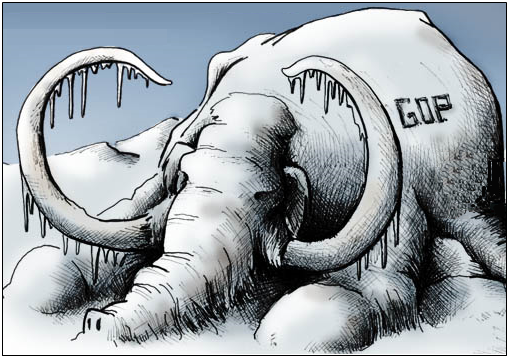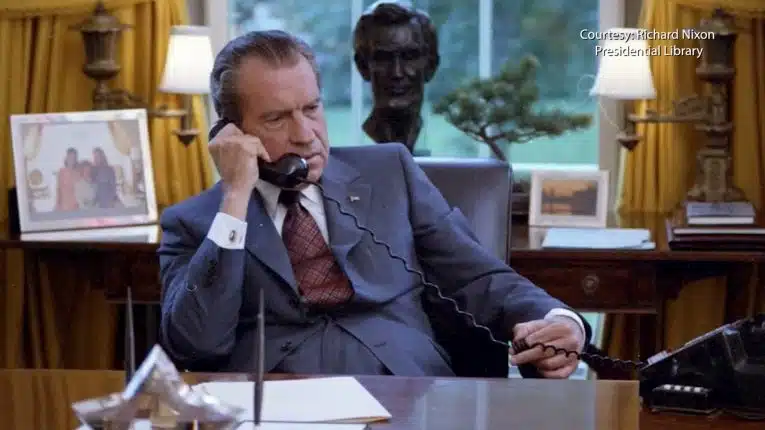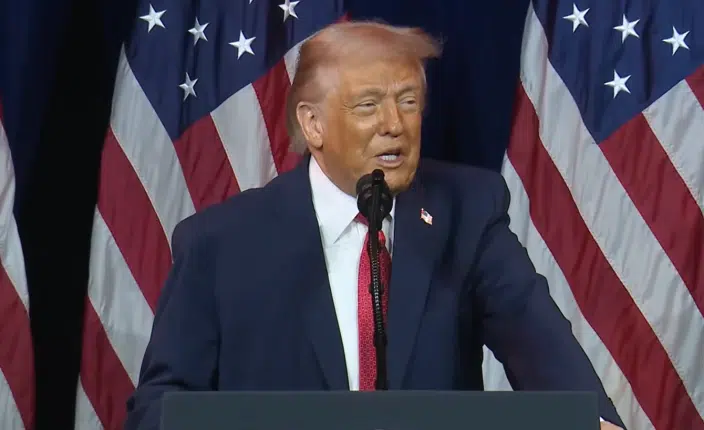In 2004, Republican popular vote totals for president peaked — at 62,040,610 votes for George W. Bush.
They have been down ever since.
59,948,323 votes were cast for John McCain in 2008. And 60,933,500 votes were cast for Mitt Romney in 2012.
Meaning, in the past decade, Republicans have proven unable to expand their voting coalition.
While many analyses will often focus on candidate selection or issue selection by the party, offering a range reasons, usually ideological but also applying to the candidates of themselves, of being too moderate or too conservative.
But what if there is a different reason, a more obvious truth for the shrinking Republican electorate?
Perhaps the reason fewer people are voting Republican is simply because there are fewer Republicans who are still alive.
The Greatest Generation, which weathered the Great Depression and then fought and won World War II, is all but gone. In 2004, there were still more than 4 million surviving World War II veterans, according to the National World War II Museum. By 2012, that number had shrunk to little more than a million. By 2016, it will be far less than a million.
If you include their spouses at roughly the same count, bringing the total to about 8 or 9 million, that means in the past 2 election cycles, more than 6 million have died. By 2016, nearly all of them will have died.
According to research by Gallup, what was left of the Greatest Generation was roughly split politically and ideologically as recently as 2013 — 47 percent Republican or lean-Republican versus 46 percent Democrat or lean-Democrat. There, the death rate would have hurt each party roughly equally.
As for the Silent Generation — those born in between the Greatest Generation and Baby Boomers — it is 50 percent to 43 percent in favor of Republicans, including leaners. As that generation now dies off, it will disproportionately hurt Republicans.
In the meantime, their replacements in the voting age population at the younger end of the spectrum, have unquestionably skewed Democrat. Millennials, those born between 1980 and 1996, register 53 percent Democrat or lean-Democrat compared to 35 percent who are Republican or lean-Republican.
As for Baby Boomers, they are roughly split, 46 percent to 44 percent in favor of Democrats, including leaners.
Meaning, quite literally, the Republican Party is dying off, and unless something changes rather quickly, the GOP may never have as many votes as it does right now.
UPDATE: It is worth pointing out that as a generation, Millennials are now actually larger than the Baby Boomers, according to Pew, 75.3 million to 74.9 million as of 2014. There are 29 million Silent Generation left. Based on the percentages of voter ID and lean-ID from Gallup above, that means headed into 2016 Democrats have a potential pool of about 86.8 million voters — 39.9 million 18-35, 34.5 million 51-70, and 12.47 million 70+. Republicans have a potential pool of 73.8 million voters — 26.35 million 18-35, 33 million 51-70, and 14.5 million 70+. The real edge, obviously, is with the younger voters. This is somewhat neutralized by lower turnout among younger voters, but eventually they won’t be so young anymore, and at a certain point, voter attitudes set in for life.
That is the stage, and at least explains what has taken place in 2008 and 2012.
But what looks like perhaps an insurmountable demographic decline could actually represent an enormous opportunity in disguise for the GOP. The three keys will undoubtedly be: 1) Maximizing turnout of the remaining Silent Generation by emphasizing that 2016 is their last stand; 2) Skewing Baby Boomers towards Republican as they now retire and worry about the future they are leaving their children; and 3) Somewhat neutralizing the advantage among Millennials as they enter their full-time careers and whose concerns are now shifting away from social issues to economic concerns.
Add to that an overarching emphasis on security issues in the wake of Paris and San Bernardino, including high anxiety over immigration and terrorism, as well as economic issues including immigration, trade, globalization, and jobs. Voters, particularly Republican voters, see a nation in decline.
Suddenly, then, it is easy to see why the two current Republican frontrunners, Donald Trump and Ted Cruz, have excelled. Both have taken a hard line on immigration, and neither supported granting fast track trade authority to Barack Obama. What you find is a Republican electorate that is receptive to a working class populist message that is also tough on security that has confounded the political establishment.
Now, how will that message reflect back into the general election remains to be seen. But some signals could be coming from Democrat frontrunner Hillary Clinton, who just last month was mocking Republican concerns over Syrian refugees but now, in the wake of San Bernardino, is praising efforts in Congress to increase FBI scrutiny of the refugees coming from the Syria and Iraq war.
“The United States has to take a close look at our visa programs, and I am glad this administration and Congress are stepping up scrutiny in the wake of San Bernardino,” Clinton told a crowd of her supporters at the University of Minnesota in Minneapolis on Dec. 15.
What polls is Clinton looking at to suggest she needs to triangulate on immigration and visas — before the Iowa Caucuses and New Hampshire primary have even begun? It is notable that Clinton is watching her right flank. That might mean events are reshaping the political landscape faster than politicians can respond.
Meaning there could in-roads for Republicans to not only political independents, where the usual battle for the middle occurs in the general election, but also to Democrats, who might be afraid their party cannot keep them safe.
What is clear is that in order to succeed, Republicans need to replace their ranks by building on the base they have, and the current political earthquake on security might be what it takes to shake up the current electorate and put voters on the table nobody thought could be moved just two months ago.
Robert Romano is the senior editor of Americans for Limited Government.







